| Cover Story
From Insight Desk
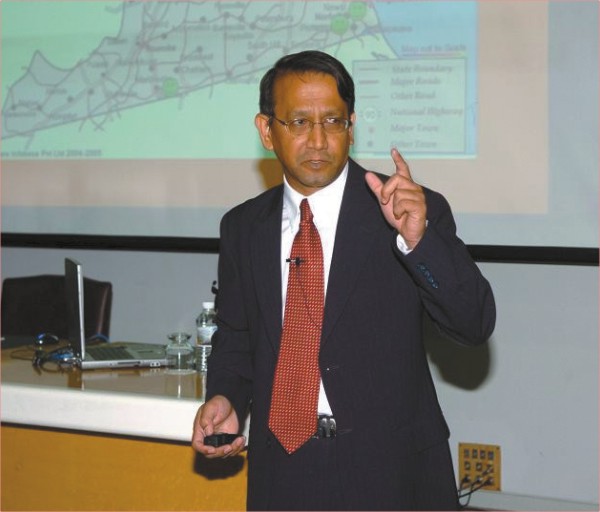
Dr. Mohammad Ataul Karim
Beyond Excellence in Physics
Star Insight proudly features Dr. Mohammad Ataul Karim, a Bangladeshi Physicist living and working in America. He is currently the Vice President for Research at the Old Dominion University (ODU) in Norfolk, Virginia. Read on to get a glimpse of his various accomplishments in teaching, research and education management.
...........................................................................................................
DR. Mohammad Ataul Karim is a Bangladeshi Physicist living and working in America. He is currently the Vice President for Research at the Old Dominion University (ODU) in Norfolk, Virginia. He oversees the usage of over $100M in research and development expenditures per year; the university's funded research portfolio includes 1245 persons (206 faculty researchers, 264 non-faculty professionals, 398 research assistants, and 377 others). He has been serving as chair of the International Program Committee (IPC) of the International Conference on Computing and Information Technology (ICCIT) since 2001 and as chair of the Technical Committee of the International Conference on Industrial Electronics, Technology & Automation (IETA) since 2005. He reviews over a dozen academic articles for journal publications every year.
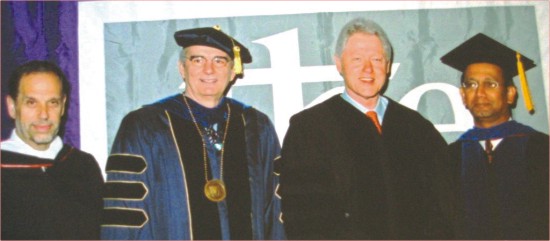
Dr. Karim with Bill Clinton at the University of Arkansas
Dr. Karim is the North American Editor of "Optics and Laser Technology," an Associate Editor of "IEEE Transactions of Education," and serves on the editorial boards of both "Microwave and Optical Technology Letters" and "World Journal of Modeling and Simulation." He has guest edited 24 journal special issues. Prior to joining ODU, Mohammad Karim served as Dean of Engineering at the City College of New York of the City University of New York (2000-2004), where he led the establishment of three new undergraduate degree programs: biomedical engineering, computer engineering, and earth and environmental systems science and engineering. With these degree programs in place, the Engineering Department was able to offer 8 bachelors, 6 masters and 6 doctoral programs. Biomedical Engineering was the newest discipline at CUNY in over 20 years. Before CUNY, Dr. Karim served as the Head of Electrical and Computer Engineering at the University of Tennessee (1998-2000), where he initiated a new undergraduate degree program in computer engineering in partnership with computer science. This new program helped attract additional students thus allowing the department (thereafter renamed as Department of Electrical and Computer Engineering) to reverse its declining enrollment trend of the previous years. This program enhancement strategy and re-alignment of faculty strengths, in part, allowed the department to merge with Computer Sciences. The merged unit succeeded also in attracting a $12.5M endowment and additional major state support that led to the establishment of Min Kao Department of Electrical Engineering & Computer Science. Prior to this he had also served as the Chair of Electrical and Computer Engineering (1994-1998) and Founding Director of Electro-Optics (1990-1998) at the University of Dayton in Ohio. Triumphs in his own academics and in his ability to empower the same in others have marked his career from beginning till now. His contributions in education management in all the universities he has served at speak of his diversified talents.
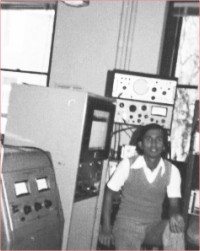 “As I take a step forward, my mind starts to calculate my next step. By the time I proceed further, I know exactly where my steps may lead,” says Dr. Karim. And the result of that approach is evident in the plethora of accomplishments under his name. He has written 18 text and reference books, over 350 research papers, 7 book chapters, 10 book reviews, 3 US patents, and numerous technical reports and editorials. His books Digital Design: A Pragmatic Approach (1987), Electro-Optical Devices and Systems (1990), Optical Computing: An Introduction (1992), Electro-Optical Displays (1992), Continuous Signals and Systems with Matlab (2001, 2009), and Digital Design: Basic Concepts and Principles (2008) are used in universities throughout the world. He is an elected fellow of the Institute of Electrical and Electronics Engineers (IEEE), the Optical Society of America (OSA), the Society of Photo-Instrumentation Engineers (SPIE), Institute of Physics (InstP) of United Kingdom, Institution of Engineering and Technology (IET) of United Kingdom, and Bangladesh Academy of Sciences (BAS) and a Distinguished Engineering Fellow of the University of Alabama. “As I take a step forward, my mind starts to calculate my next step. By the time I proceed further, I know exactly where my steps may lead,” says Dr. Karim. And the result of that approach is evident in the plethora of accomplishments under his name. He has written 18 text and reference books, over 350 research papers, 7 book chapters, 10 book reviews, 3 US patents, and numerous technical reports and editorials. His books Digital Design: A Pragmatic Approach (1987), Electro-Optical Devices and Systems (1990), Optical Computing: An Introduction (1992), Electro-Optical Displays (1992), Continuous Signals and Systems with Matlab (2001, 2009), and Digital Design: Basic Concepts and Principles (2008) are used in universities throughout the world. He is an elected fellow of the Institute of Electrical and Electronics Engineers (IEEE), the Optical Society of America (OSA), the Society of Photo-Instrumentation Engineers (SPIE), Institute of Physics (InstP) of United Kingdom, Institution of Engineering and Technology (IET) of United Kingdom, and Bangladesh Academy of Sciences (BAS) and a Distinguished Engineering Fellow of the University of Alabama.
Dr. Karim's area of research encompasses optical computing, information processing, pattern/target recognition, night vision, displays, electro-optical systems, and sensors. The list of his past and current research sponsors include US Air Force, Naval Research Laboratory, US Army, National Science Foundation, NASA, US Department of Education, Ohio Aerospace Institute, US Department of Defense, and Wright-Patterson Air Force Base. During his academic career, he served as research mentor of 57 MS/PhD students. As a researcher, he has implemented research grants worth millions of dollars. Born in 1953, Dr. Mohammad Ataul Karim received his BS Honors Degree in Physics from the University of Dhaka in 1976. He went on to complete his graduate and doctoral qualifications from at the University of Alabama. He was ranked first among the 39,488 students who took the Bangladesh's Higher Secondary Certificate Examination in 1972, and fourth among the 64,432 students who took the Secondary School Certificate Examination in 1969.
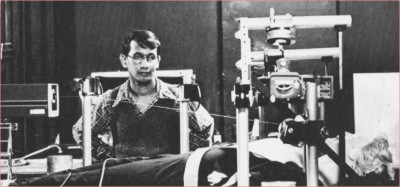
He has received numerous awards: Outstanding Engineering Research Award (1998), Outstanding Scientist Award (1994), Alumni Award in Scholarship (1991), NASA Tech Brief Award (1990), Up and Comers Education Award (1990), and NCR Stakeholder Award (1989). He has been listed in American Men and Women in Science, Marquis International Who's Who in Optical Science & Engineering, Who's Who in Science and Engineering, Who's Who in America, Outstanding People of the 20th Century, Dictionary of International Biography, and 2000 Outstanding Scientists of the 20th Century. Dr. Karim and his wife Setara lives in Virginia Beach, VA. They have a son, Lutfi, and two daughters, Lamya, and Aliya. A 2004 Government of Bangladesh report and a number of books in Bangla including Bangladesher Shera Bigyani (2004) and Medhabi Manusher Golpo by Mohammad Kaykobad (2005) cited him as an example of outstanding success of the Bangladeshi Diaspora.
'I am very hopeful about the future of Bangladesh'
- Dr. Mohammad Ataul Karim
 Arun Chowdhury had the opportunity of interviewing Dr. Mohammad Ataul Karim when he was in the US a while back. The following are selected excerpts of their conversation. Arun Chowdhury had the opportunity of interviewing Dr. Mohammad Ataul Karim when he was in the US a while back. The following are selected excerpts of their conversation.
Arun Chowdhury: People at home and abroad are well-informed of your professional accomplishments, but very few know about your upbringing and about your life prior to immigrating to the US. Could you please tell us a bit about your childhood?
Mohammad Ataul Karim: I was born in 4 May 1953 a village called “Borolekha”, which is now an upazila within the district of 'Moulvibazar'. My father was a physician, and although most doctors preferred to stay in urban areas, my father wanted to live in the village. My ancestors had come to the then East Pakistan from Assam and Meghalaya, India. My mother came to the country after getting married to my father in 1952, but my father was there since 1947. My father was a disciplinarian and my mother was my home tutor. I attended Shatma Primary for elementary education, Patharia Chotolekha High for a year, after which I got enrolled in Faujdarhat Cadet College. I was there for about four years. Back in my time it used to be known as East Pakistan Cadet College, it was the only Cadet College in the region. I attended Sylhet MC College for two years and then joined University of Dhaka in 1972. I completed my Bachelors in Physics in 1976. I got admitted to the University of Alabama before my result was released, and took off for the US in the same year.
AC: What did you study at Alabama? When did you start to teach?
MAK: I started my Graduate Programme in Physics at Alabama. I obtained Masters in two areas- in Physics (1978) and in Electrical Engineering (1979). I obtained a PhD in Electrical Engineering from the same university in 1982. I started teaching in 1981 at the University of Arkansas at Little Rock. Bill Clinton was the Governor of Arkansas then who would also teach there as well at the time.
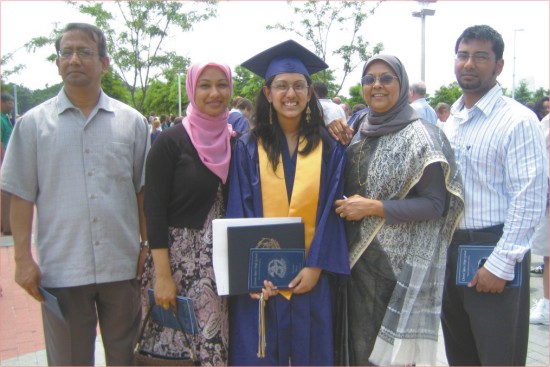
Dr. Mohammad A. Karim with his wife and children at his daughter's graduation
AC: Please tell us a bit about how you came to be associated with the fastest train technology in America.
MAK: Physics, as a subject, covers the entire universe. We have a few outstanding researchers at my university who were concerned with developing efficient transportation mechanisms which led to developing the concept of high-speed train. My role is more in the realm of generating funding to keep this project moving forward. In concept, it was simple. We wanted to create a train that would not directly touch the rails, therefore not allowing speed to be lost through friction. It can be achieved through a magnetic force. The problem was that the earlier European design based on repulsive magnetic force required railway tracks to be set up that simply were too expensive- roughly 115 million US dollars per mile! So, this had serious limitations for wide-scale implementation.
AC: What did you do to overcome the problem?
MAK: Our researchers started to think alternatively - instead of improving the tracks, we thought of improving the technology of the train itself by making use of attractive magnetic force with the aim of making the solution cost effective as well. At the end, we estimate that the average costs per mile can come down to about 13 million US dollars.
AC: Looking at your numerous research works, books, academic and other responsibilities, once would be stifled at how much free time you have.
MAK: I don't have any, but I enjoy being a workaholic. When I go to Bangladesh I have a special advantage since night time in Bangladesh is day time in the US. I can keep up with my tasks in the US at night after I am done with my activities during the day.
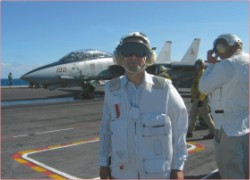 AC: You are an exceptionally talented person. Which side of the family do you think this talent came from? AC: You are an exceptionally talented person. Which side of the family do you think this talent came from?
MAK: My father's side. I learnt a lot from my father, till the very end before his death. My father used to communicate with me through letters.
AC: Do you still have the letters?
MAK: I could never lose them! These letters are priceless possessions of mine and I often discuss them with my children.
AC: Please tell us a bit about your own family.
MAK: I got married to my wife Setara in 1977. My wife is a biochemist and was my classmate. Her father was one of my teachers. I have two daughters and a son. My son lives in Boston with his wife; he is also an Electrical Engineer. He is married to a student of medicine who is working towards becoming a physician. One of my daughters is studying biomedical engineering and the other one just finished her high school and is going to pursue studying journalism.
AC: I would like to ask you a few questions regarding Bangladesh. What would you advice Bangladeshi policymakers in regard to the immense traffic congestion problem?
|
Dr. Mohammad A. Karim
with his wife |
MAK: I think Bangladesh is missing the most important scientific tool - simulation. In Bangladesh, no one can properly predict the outcomes of a policy intervention. In regard to outcomes specific to seasons, months and varying circumstances, they can say even less. As a result, we can only look at traffic problems after they happen. What policy will work and which one will not can be predicted before the policy is used through simulation of that policy. Most actions taken to solve the problem have been short term and small scale. If a full scale simulation was set up first, then the impact of each intervention could be simulated. Instead of putting the general people through an agonizing trial-and-error process, the simulation would be able to tell policymakers which policies would bring about the desired impact, and which policies would not.
AC: What are your thoughts about the future of Bangladesh? Will Bangladeshis in general be able to compete at the same level as developed countries?
MAK: In many cases, they already are. Every year when I visit Bangladesh, I have the opportunity of meeting a few youngsters. I find that they are accomplishing that which I could not when I was in their position. Let me give you an example - every year for the last 11 years, a BUET team has been participating in an international programming competition called the ACM International Collegiate Programming Contest and has been a contender in the final stage for each of those 11 years. Such a claim can only be made by a handful of universities globally. In 2008, a BUET team secured the 31st position. In 2009, both BUET and NSU teams participated. Being ranked the 31st team globally is an incredible feat! Let me tell you, not a single American University had a higher rank than BUET in 2008. It makes me proud to think that these students were trained by Bangladeshi teachers. I am very hopeful about the future of Bangladesh.
Copyright
(R) thedailystar.net 2011
|
